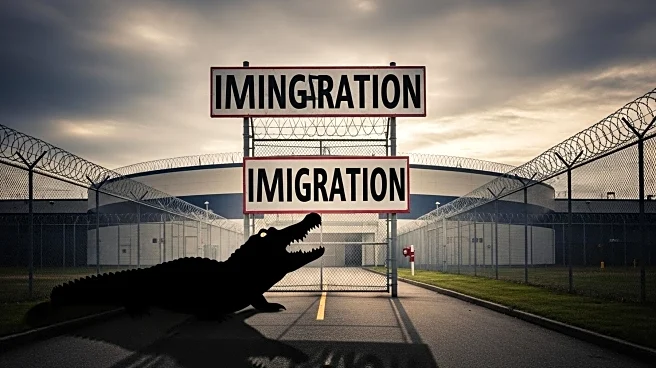What is the story about?
What's Happening?
The Department of Homeland Security (DHS) is closing the controversial immigration detention center known as 'Alligator Alcatraz' in Florida's Everglades. This decision follows a judge's order for a preliminary injunction, citing improper protocol during the facility's construction. The center, which opened two months ago, has been a focal point in debates over President Trump's immigration policies. Reports on the conditions inside have been conflicting, with Republicans describing it as well-maintained, while Democrats have criticized it as unsanitary. The facility was built to house 3,000 detainees but never reached full capacity. It has been a symbol of the administration's crackdown on illegal immigration, drawing both protests and support.
Why It's Important?
The closure of 'Alligator Alcatraz' highlights ongoing tensions in U.S. immigration policy under President Trump. The facility's shutdown is a setback for the administration's efforts to manage immigration through temporary detention centers. It underscores the legal challenges faced by the government in implementing its immigration strategies. The decision may impact the broader debate on immigration enforcement and the treatment of detainees, potentially influencing public opinion and policy decisions. Stakeholders, including immigrant rights groups and political leaders, are likely to react to this development, which could affect future immigration policies and practices.
What's Next?
With the closure of 'Alligator Alcatraz', DHS is expected to comply with the court order while appealing the decision. The agency may focus on building more permanent detention facilities, as indicated by border tsar Tom Homan. Other temporary facilities are being constructed in Republican-led states, suggesting a continued emphasis on immigration enforcement. The ongoing lawsuit against the Trump administration regarding detainee access to legal counsel may further influence the future of immigration detention practices. Political and legal battles over immigration policy are likely to continue, shaping the landscape of U.S. immigration enforcement.

















